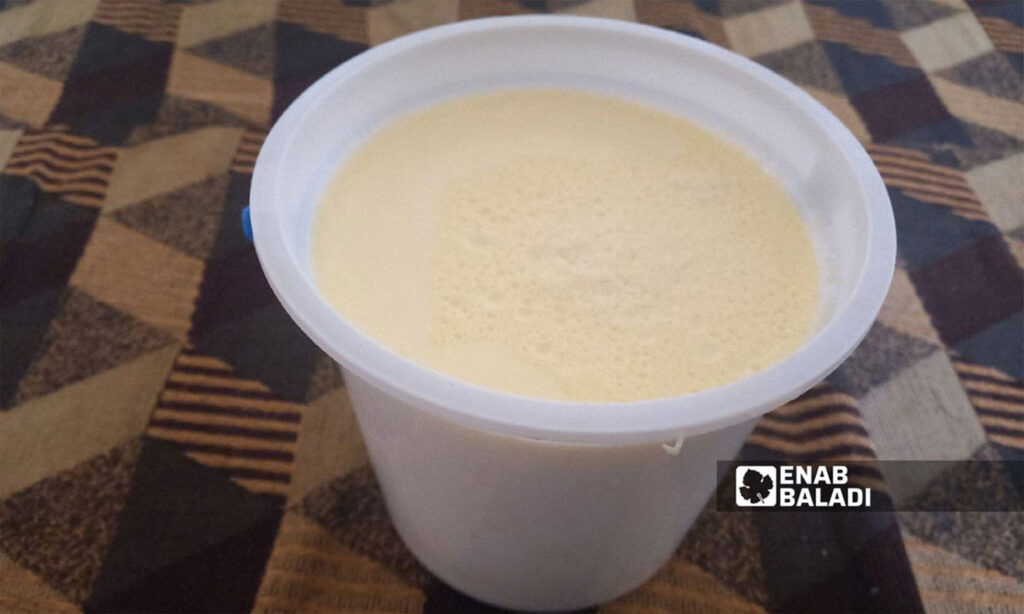Enab Baladi – Daraa
The increase in milk prices by merchants led to a direct increase in the prices of dairy products since the beginning of June in Daraa governorate, southern Syria, which was reflected on consumers as a result of their weak purchasing power.
The price per kilogram of milk increased from 1,450 to 1,600 Syrian pounds, an increase that does not fulfill the ambition of livestock breeders to make profits compared to production costs, the most important of which is feed prices, as the price hike does not cover the costs.
Prices of cheese, dairy hike
Huda, 25, who refused to give her full name for security reasons, told Enab Baladi that cheese and “Labneh” have become luxury staples on the breakfast table for a number of families in the southern Daraa governorate, who are no longer able to afford its prices.
The price of a kilo of cheese reached 12,000 SYP, and a kilo of “Labneh” reached 10,000 SYP.
The high prices of dairy made Huda resort to reducing her dependence on it in meals or even in preparing dishes that depend mainly on yogurt, requiring at least two kilograms of it at the cost of about 5,000 SYP.
Mohammed, 28, who is the owner of a food store in the town of Tafas, told Enab Baladi that the main reasons for the increase in the price of dairy and cheese are the increase in the price of milk.
Mohammed explained that the demand for milk increases in the summer because it is sold to ice cream factories.
The general level of prices is witnessing almost daily repeated rises, affecting basic and food commodities and the already weak purchasing power of residents in regime-held areas.
The US dollar is trading at around 4000 Syrian pounds, according to the Syrian Pound Today website, which specializes in exchange rates and foreign currencies.
Milk sales go to buying fodder
Every morning, the merchants’ cars roam the cattle breeders’ homes to buy milk from them and supply it to factories. The merchant pays the breeder for the milk with a weekly bill.
Zuhair, 28, a cow breeder in Daraa governorate, collects the value of the bill he receives weekly in return for selling milk and takes it to the feed mill to pay it there, surprised each time at the high price of fodder parallel to the price of milk.
Zuhair (withheld his full name for security reasons) said that he is selling milk to pay for the fodder only, indicating that he pays more than the price of the milk he sells.
The price of a kilo of cottonseed fodder reached 2,400 Syrian pounds, a kilo of barley reached 2,200 pounds, a kilo of corn reached 2,500 pounds, and broad beans reached 2,200 pounds.
The costs of raising cows are not limited to fodder only, as the hay market is also witnessing a rise, especially after the weak production of the wheat season for the current year and the exclusion of rainfed wheat areas from the production process.
According to the breeder, each cow annually needs about 20 bags of hay (each bag equals 35 kilos). Its price during the harvest period was estimated at 600 SYP.
Another issue that increases the suffering of the breeders is the treatment of livestock in Daraa, as the veterinarian’s visit costs not less than 20,000 Syrian pounds.
Osama Hammoud, Director of Animal Production in the regime’s Agriculture Ministry, stated on 26 February that the livestock sector in Syria had lost about 40 to 50 percent of its herd due to the global rise in feed prices, in addition to the economic conditions and hardships.
Hammoud spoke of a major problem that threatens efforts to restore livestock, represented by the inability of breeders to continue the breeding process, which prompts them to sell a large part of their herds to secure the needs of the other section.











